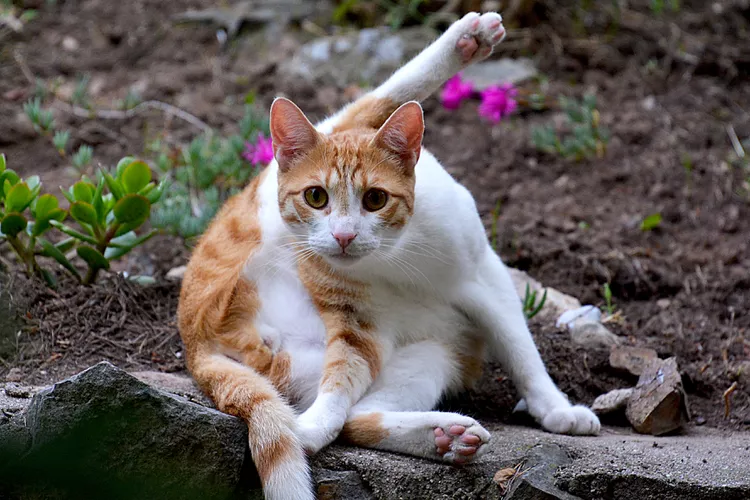Cats and Obsessive Compulsive Behaviors

You may have heard of obsessive-compulsive disorder, but did you know cats can have forms of this disorder too? Obsessive-compulsive behaviors in cats may mean your cat has obsessive-compulsive disorder. However, the behaviors may actually be secondary to other health or behavioral issues.
What Is Obsessive-Compulsive Disorder?
Commonly abbreviated as OCD, obsessive-compulsive disorder is a behavioral disorder that causes a cat to engage in certain "rituals" for seemingly no good reason. These are generally abnormal, repetitive, and exaggerated behaviors that do not seem to serve a practical purpose.
There is no specific known cause of feline OCD, but it does seem more prevalent in certain cat breeds. Feline OCD may be genetic, but this is uncertain.
Signs of OCD in Cats
Cats with OCD will exhibit one or more obsessive-compulsive behaviors. Some cats will have several abnormal behaviors, while others will only show one primary obsessive-compulsive behavior.
- Overgrooming is one common sign of OCD. Cats with OCD might lick or chew their fur to such an extent that hair loss becomes apparent. Remember that overgrooming could also be a sign of allergies to food, flea bites,
- Some cats will obsessively suck, lick, or chew on fabric. This is often called wool-sucking.
- Tail-chasing and/or self-mutilation may occur as obsessive-compulsive behaviors.
- Frequent, repetitive pacing and/or vocalizing are some other potential signs of OCD in cats. However, these behaviors can mean a number of things.
- Feline Hyperesthesia Syndrome may be seen in cats with OCD. Also called rippling skin syndrome, twitchy skin syndrome, and rolling skin syndrome, this condition is not well understood. It often involves "twitching" skin on the back, sensitivity to touch, and vocalization.
All of these behaviors can start out as normal occasional activities for your cat. Or, the behaviors may be triggered by environmental or physical situations. Over time, the behaviors may become fixed, no longer needing external triggers to begin. Obsessive-compulsive behaviors may be reinforced by pain-relieving and pleasure-inducing chemicals in the brain. The behaviors may even become a coping mechanism for a cat in a stressful situation or a cat with anxiety.
How to Diagnose OCD in Cats
OCD cannot be diagnosed with a specific test. Usually, the pattern of behavior is enough to suspect OCD. However, it is important to rule out other causes of the behavior before making a diagnosis. If your cat is exhibiting obsessive-compulsive behaviors, see your veterinarian first.
To diagnose OCD in cats, the veterinarian will first need to rule out medical causes of your cat's behaviors. For example, overgrooming may be related to a skin problem. Your vet will ask several questions about your cat's history and behavior. It may be helpful to show the vet a video of your cat engaging in abnormal behaviors. A physical examination will be performed to look for abnormalities. The vet may also recommend lab testing to rule out problems that can't be detected with an examination only.
If all testing comes back normal, your vet may still decide that your cat does indeed have OCD. The vet will discuss treatment options with you. In serious cases, your vet may refer you to a veterinary behaviorist.
Treatment for Feline Obsessive-Compulsive Disorder
There is no known cure for OCD, but there are some treatments that can reduce or even eliminate the signs.
First of all, do your best not to soothe, comfort, or reward your cat when she exhibits obsessive-compulsive behaviors. Doing so may reinforce the behaviors, making your cat do them even more. Instead, focus on keeping a predictable schedule for your cat. Following a solid daily routine can give your cat reassurance and reduce stress.
Nutritional supplements or natural remedies may be recommended by your vet to help reduce your cat's stress level. These may be used with or without prescription medications, depending on the severity of your cat's OCD. Calming supplements may include tryptophan, L-Theanine, vitamins, and herbs.
Warning
Some vets have even begun to recommend hemp-based CBD (cannabidiol) in pets with anxiety. Note that this is NOT marijuana-based, as that can be toxic to cats.
Prescription medications are commonly needed for cats with moderate to severe OCD. These drugs alter brain chemistry to reduce stress and change the pattern of disordered behaviors.
If your cat suffers from OCD, be sure to stay in touch with your vet about your cat's progress. Do not change or stop medications without discussing it with your vet first. Know that treatment protocols may need to be periodically adjusted. Be sure to let your vet know right away if there is a change in your cat's behavior.